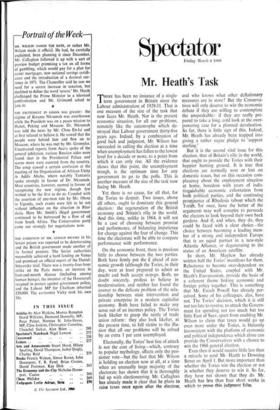Mr. Heath's Task
THERE has been no instance of a single- 1 term government in Britain since the Labour administration of 1929-31. That is one measure of the size of the task that now faces Mr. Heath. Nor is the present economic situation, for all our problems, remotely like the catastrophe which de- stroyed that Labour government thirty-five years ago. Indeed, by a combination of good luck and judgment, Mr. Wilson has succeeded in calling the election at a time when unemployment has fallen to the lowest level for a decade or more, to a point from which it can only rise. All the evidence shows that this point, the unemployment trough, is the optimum time for any government to go to the polls. This is another measure of the size of the task' now facing Mr. Heath.
Yet there is no cause, for all that, for the Tories to despair. Two issues, above all others, ought to dominate this general election : the regeneration of the British economy and Britain's role in ffie world. And this time, unlike in 1964, it will not be a case of choosing between promise and performance, of balancing impatience for change against the fear of change. This time the electorate will be able to compare performance with performance.
On the economic front, there is precious little to choose between the two parties. Both have firmly put the £ ahead of eco- nomic growth (although the Tories, in their day, were at least prepared to admit as much) and both accept stop-go. Both, no doubt sincerely, profess to believe in modernisation, and neither has found the answer to the delicate problem of the rela- tionship between state intervention and private enterprise in a modern capitalist economy. Both have failed to make any sense out of an incomes policy. The Tories look likelier to grasp the nettle of trade union reform: they also look likelier, at the present time, to fall victim to the illu- sion that all our problems will be solved by an extra 1 per cent unemployed.
Electorally, the Tories' best line of attack is not the cost of living—which, contrary to popular mythology, affects only the pen- sioner vote—but the fact that Mr. Wilson is holding an election now at all, at a time when an unusually large majority of the electorate has shown that it is thoroughly fed up with electioneering. Mr. Callaghan has already made it clear that he plans to raise taxes once again after the election; and who knows what other deflationary measures are in store? But the Conserva- tives will only deserve to win the economic debate if they are willing to contemplate the unspeakable : if they are really pre- pared to take a long, cold look at the over- powering case for a planned devaluation. So far, there is little sign of this. Indeed, Mr. -Heath has already been trapped into giving a rather vague pledge to 'support sterling.'
But it is the second vital issue for this election, that of Britain's role in the world, that ought to provide the Tories with their happier hunting ground. It is true that elections are normally won or lost on domestic issues, but on this occasion com- placency about the employment situation at hotne, boredom with years of indis- tinguishable economic exhortation from both political parties, and the continuing prominence of Rhodesia (about which the Tories, tor once, have the better of the argument) may well conspire to persuade the electors to look beyond their own back gardens. And if, and when, they do, they could be faced with a clear choice—the choice between becoming a leading mem- ber of a strong and independent Europe that is an equal partner in a new-style Atlantic Alliance, or degenerating to the status of an American satellite.
In short, Mr. Mayhew has already written half the Tories' manifesto for them. Reluctance to become over-dependent on the United States, coupled with Mr. Heath's Europeanism, provide the basis of a coherent theme linking economic and foreign policy together. This is something that Mr. Enoch Powell has already per- ceived. Some of his colleagues, alas, have not. The Tories' decision, which it is still not too late to reverse, to attack the Govern- ment for spending not too much but too little East of Suez, apart from enabling Mr. Wilson to claim that taxes would go up even more under the Tories, is blatantly inconsistent with the platform of economic and political independence which alone can provide the Conservatives with a chance to win the 1966 general election.
Even then it would require little less than a miracle to send Mr. Heath to Downing Street on April 1. But more important than whether the Tories win the election or not is whether they deserve to win it. So far, they have not shown that they do. Mr. Heath has less than four short weeks in which to prove this judgment false.


































 Previous page
Previous page